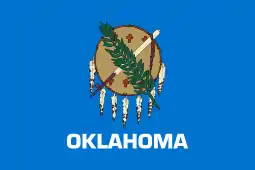Oklahoma Pardon and Parole Board
The Oklahoma Pardon and Parole Board is the parole board of the state of Oklahoma. The Board was created by an amendment to the Oklahoma Constitution in 1944.[1] The Board has the authority to empower the Governor of Oklahoma to grant pardons, paroles, and commutations to people convicted of offenses against the state of Oklahoma.
| Agency overview | |
|---|---|
| Formed | July 11, 1944 |
| Headquarters | Oklahoma City, Oklahoma |
| Employees | 30 classified 3 unclassified |
| Annual budget | $2,333,000 (FY-2019) |
| Ministers responsible |
|
| Agency executive |
|
| Website | www.ppb.ok.gov |
The Board meets each month at one of the State penal institutions.
Mission statement
The mission of the Pardon and Parole Board as a vital part of the criminal justice system is to determine the best possible decision, through a case-by-case investigative process and to protect the public while recommending the supervised released of adult felons.[1] Although, in recent years the Board has been mandated to assist with alleviating prison overcrowding, it remains a goal to maintain a low revocation & recidivism rate for the State of Oklahoma.
Composition
The Board is composed of five appointive members. Three are appointed by the Governor of Oklahoma, one by the Chief Justice of the Oklahoma Supreme Court, and one by the Presiding Judge of the Oklahoma Court of Criminal Appeals. Board members serve four year terms that run concurrent with the term of the Governor.
Any member of the board that is a licensed attorney is prohibited from representing in any Oklahoma court any persons charged with felony offenses.
Board Membership[2]
| Name | Appointee Type | Term Expiration |
|---|---|---|
| Robert Gilliland, J.D.
Chairman |
Governor Appointee | January 2023 |
| Adam Luck, M.P.P. | Governor Appointee | January 2023 |
| Kelley Doyle, M.A. | Governor Appointee | January 2023 |
| Larry Morris | Oklahoma Criminal Court of Appeals Appointee | January 2023 |
| Allen McCall, J.D. | Supreme Court of Oklahoma Appointee | January 2023 |
Powers and Responsibilities
The Constitution grants the Governor the power to grant commutations, pardons and paroles for all offenses against the State upon such conditions and with such restrictions and limitations as they may deem appropriate. However, the Governor can not exercise these powers unless he submits the name of the individual to the Board. The Board will then review the applicant for clemency. The Board is responsible for making an impartial investigation and study of applicants for clemency.
If a majority of the Board votes in favor of the clemency, the Governor is empowered to make such acts of clemency for the individual as he deems necessary. The Board has no authority to make recommendations regarding parole in the case of convicts sentenced to death or life imprisonment without parole. However, the Board may recommend commutations and pardons for such offenses. The Board's authority, however, can not limit the Governor's power to grant, after conviction, reprieves, or leaves of absence not to exceed sixty days without the consent of the Board.
The Oklahoma Legislature's passage of HB 1269 in 2019, marked an update to the Board's authority on commutation actions.[3] HB1269 created authority for the Board to establish accelerated, single-stage dockets to consider and recommend commutations to the Governor, provided certain criteria are met. Accelerated dockets are to be composed of cases in which applicants were serving time for felony convictions that had been subsequently reclassified as misdemeanors, and could be considered in mass, rather than solely on an individual basis.
Commutations Under HB1269 Authority
The Pardon and Parole Board considered 814 inmates' cases on November 1, 2019, the first day HB1269 became effective.[4] The Board unanimously voted to recommend commutation for 527 Department of Corrections inmates to Governor Kevin Stitt.[4]
The action represented the largest number of single-day commutations in the history of the state, nationally according to press reports.[5][6][7]
See also
- Governor of Oklahoma
- Parole board
- Pardons in the United States
- William S. Key, served as Chairman of the Board following World War I
References
- "Oklahoma Pardon and Parole Board - Agency History". www.ok.gov. Retrieved 2020-04-23.
- "Oklahoma Pardon and Parole Board - Board Members". www.ok.gov. Retrieved 2020-04-23.
- "Bill Information". www.oklegislature.gov. Retrieved 2020-09-30.
- "OKLAHOMA PARDON AND PAROLE BOARD RECOMMENDS LARGEST SINGLE-DAY COMMUTATION IN U.S. HISTORY | Welcome to Governor Stitt". www.governor.ok.gov. Retrieved 2020-09-30.
- "Hundreds Of Oklahoma Inmates Freed In Country's Largest Single-Day Commutation". www.kosu.org. Retrieved 2020-09-30.
- "Oklahoma Pardon and Parole Board to vote on hundreds of cases in what could be largest commutation in U.S. history". Oklahoman.com. 2019-11-01. Retrieved 2020-09-30.
- Bellware, Kim. "Oklahoma approves largest single-day commutation in U.S. history". Washington Post. ISSN 0190-8286. Retrieved 2020-09-30.
